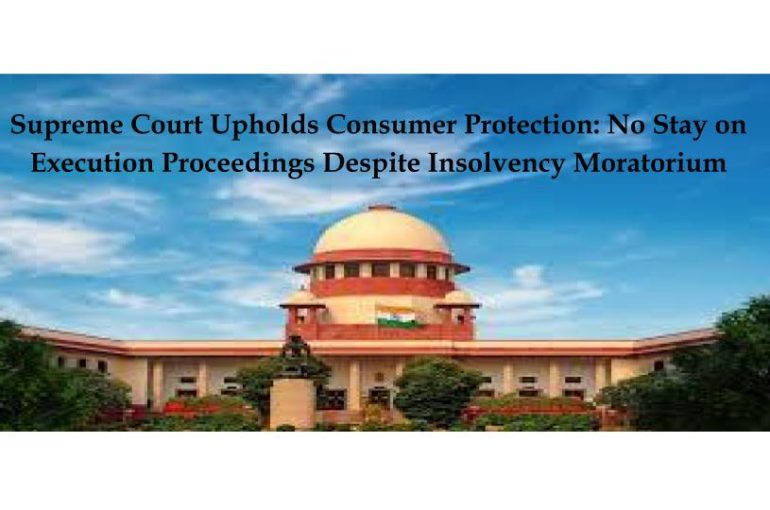Supreme Court Upholds Consumer Protection: No Stay on Execution Proceedings Despite Insolvency Moratorium
The Supreme Court of India, in its recent judgment in Saranga Anilkumar Aggarwal v. Bhavesh Dhirajlal Sheth & Ors. 2025 INSC 314, has provided a significant ruling clarifying the relationship between insolvency proceedings under the Insolvency and Bankruptcy Code, 2016 (IBC) and the enforcement of consumer protection laws. The Court categorically held that execution proceedings under Section 27 of the Consumer Protection Act, 1986 (CP Act), which imposes penalties for non-compliance with consumer court orders, are not stayed under the interim moratorium provision of Section 96 of the IBC.
Background of the Case
The case arose from an appeal filed by Saranga Anilkumar Aggarwal, a real estate developer and proprietor of East & West Builders (RNA Corp. Group Co.). The Appellant had been directed by the National Consumer Disputes Redressal Commission (NCDRC) to complete and hand over possession of residential units to homebuyers as per the agreed timeline. However, upon failing to do so, the NCDRC imposed 27 penalties against the Appellant for deficiency in service and non-compliance with its orders.
Subsequently, the Appellant, facing financial difficulties, became subject to insolvency proceedings under Section 95 of the IBC, leading to an interim moratorium under Section 96 of the IBC. The Appellant then sought a stay on the execution proceedings initiated before the NCDRC, arguing that the moratorium should apply to all legal actions, including consumer protection penalties.
Key Issues Before the Supreme Court
The central question before the Supreme Court was:
⦁ Whether execution proceedings under Section 27 of the CP Act, which penalize non-compliance with consumer court orders, are covered under the interim moratorium provided under Section 96 of the IBC.
The Appellant contended that all proceedings relating to financial liabilities must be stayed under the interim moratorium. In contrast, the Respondents (homebuyers) argued that penalties under the CP Act serve a regulatory purpose and do not fall within the definition of “debt” under the IBC.
Supreme Court’s Ruling and Reasoning
The Supreme Court dismissed the appeal, ruling that:
⦁ Distinction Between Regulatory Penalties and Debt Recovery: The penalties imposed by the NCDRC are not in the nature of “debt recovery” proceedings but are meant to enforce consumer protection laws. Unlike civil proceedings to recover financial dues, the penalties under Section 27 of the CP Act are punitive and intended to ensure compliance with consumer welfare regulations.
⦁ IBC’s Scope and Moratorium Limitations: Section 96 of the IBC stays only “legal actions in respect of any debt.” The Court noted that regulatory fines, statutory penalties, and damages imposed by tribunals do not qualify as “debts” under the IBC. Accordingly, such penalties do not receive protection under the insolvency moratorium.
⦁ Public Policy and Consumer Rights Protection: The Court emphasized that allowing an interim moratorium to stall consumer protection penalties would set a dangerous precedent. Developers and businesses could exploit insolvency proceedings to evade consumer liabilities, undermining consumer protection mechanisms.
⦁ Comparison with Criminal Proceedings: The Court drew a distinction between the penalties under the CP Act and criminal proceedings under laws such as the Negotiable Instruments Act, 1881. While criminal proceedings involving financial obligations (e.g., cheque dishonor cases) may be stayed under a moratorium, regulatory penalties aimed at ensuring compliance with statutory obligations do not qualify for such protection.
⦁ Excluded Debts Under IBC: Section 79(15) of the IBC classifies certain liabilities, including statutory fines and damages, as “excluded debts” that do not fall under the resolution framework of the IBC. Since consumer protection penalties are meant to serve a broader regulatory purpose, they fall outside the scope of debts covered by the IBC moratorium.
Implications of the Judgment
The Supreme Court’s ruling has far-reaching implications:
⦁ Strengthening Consumer Protection: By upholding the enforcement of consumer protection penalties, the Court has reinforced the effectiveness of consumer laws and deterred errant real estate developers from escaping liability through insolvency proceedings.
⦁ Clarification on the Scope of IBC Moratorium: This judgment clarifies that the moratorium under the IBC is not a blanket protection against all legal proceedings. It applies only to financial debts, not regulatory enforcement actions.
⦁ Preventing Abuse of Insolvency Laws: The decision ensures that insolvency proceedings are not misused by individuals or businesses to evade legal consequences of their failure to fulfil contractual obligations to consumers.
Conclusion
The Supreme Court’s decision in consumer protection jurisprudence by distinguishing between debt recovery and regulatory penalties, the Court has ensured that homebuyers and consumers continue to receive justice even when a developer invokes insolvency proceedings. This ruling upholds the integrity of consumer protection laws and prevents unscrupulous business practices that could exploit insolvency laws to the detriment of consumers.
Shikha Pandey
Associate
The Indian Lawyer & Allied Services
Please log on to our YouTube channel, The Indian Lawyer Legal Tips, to learn about various aspects of the law. Our latest video, titled; “Laws For Women In India” can be viewed at the link below:





































Leave a Reply